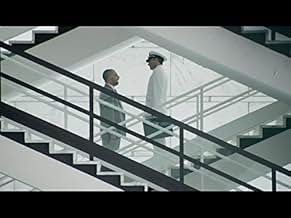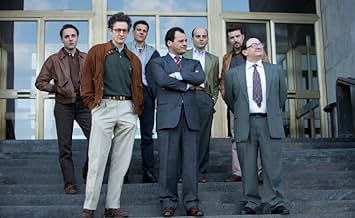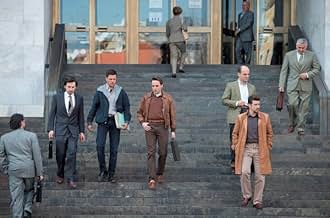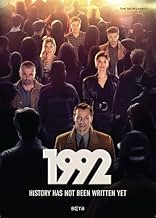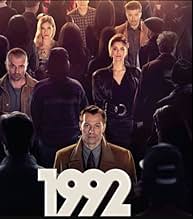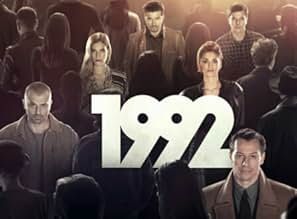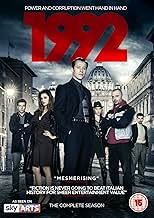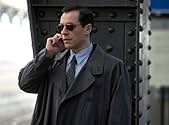VALUTAZIONE IMDb
7,5/10
2586
LA TUA VALUTAZIONE
Segue sei persone le cui vite si intrecciano con il panorama politico in rapida evoluzione dell'Italia dei primi anni 90.Segue sei persone le cui vite si intrecciano con il panorama politico in rapida evoluzione dell'Italia dei primi anni 90.Segue sei persone le cui vite si intrecciano con il panorama politico in rapida evoluzione dell'Italia dei primi anni 90.
- Creazione
- Star
- Premi
- 1 candidatura in totale
Sfoglia gli episodi
Recensioni in evidenza
Great stuff.
I'm British and finding this period in Italian history gripping.. the great acting helps too
Full confession, I grew up as an American in Rome, Italy. I return every year on vacation. I generally search out every TV/Movie production I can find in the US in Italian, and they are rare, TV shows more so than movies. 1992 is about the rise of Silvio Berlusconi, a political leader in Italy who was elected twice and disgraced twice. In real life he made his money in media like Ted Turner, but his political leanings were similar to Donald Trump. And while the show depicts the year 1992 that gave rise to Silvio, he isn't shown much and appears at the fringe of the action -- for first the Italian government must fall. And for the most part the characters that inhabit this 10 part series are fictional. But a lot of the themes are real -- i.e., the "Clean Hands" movement to rid the Italian system of corruption, and the rise of the "Lega" -- the Northern League of nationalists politically. I am subjective in my liking most well produced Italian TV. If you have an affinity for Italy, and a basic understanding of the country you will also enjoy it. It's well acted and a concise drama. And it's subtitled in English.
Here we have a wonderfully written and produced historical fiction based on events occurring in Italy (mainly) during the '90ies (this is meant to be the first season covering the year 1992). It's a pity I didn't watch it 2 years ago when it was originally released: 2 years is a lot of things watched meanwhile and I might have enjoyed it even more.
In 1992 I was 13 like the protagonist's daughter. Possibly I remember much more of that year, its vibe, people's bafflement and reactions, than most non-historians adults. Then, various cultural dynamics heavily fighting unlawful conducts matured and gained power; peculiar loathing was raised by the standard corruptive practices in politics. This resulted in a period of political instability (or irrelevance?) that hasn't actually ended yet (but that's debatable). Perhaps the major effect was the influence on the new generations' perspective: more disillusioned, and - if not more honest - at least less dumb. And still victims of yet other fairy tales: the show business, liberalism and various forms of populism.
While in today's connected world these events might seem unimportant, they represented an overwhelming wake-up call for the people of one of the major economies of the planet (like Italy was in the 90ies). And portrayed in this fashion they truly shine. Many lines, scenes and acting moments are brilliant in their gritty cynicism, evocative glamour or punching irony.
Nonetheless we have a volatile screenplay as well: mostly it's incredibly vivid but throughout the series we have also a bit too many in-depth romantic relationships, anguish-squeezing drama and trite situations. Above all: too many tight links among the fictitious/historic protagonists. They meet and influence the core story-line; then they leave each other; then they meet again and change the story again. And this happens multiple times for all the main characters: a bit too much to be believable. Writers could have given some space to other actors without generating the natural skepticism that occurs when "history worthy" things happen but no real history book talks about our fictional protagonists: is it likely?
A couple of things nearly kept me from giving the series a full 9 (i.e. like Tea Falco's delivery, Accorsi's "too cool" character, or a populist congressman and a starlet having public-sex in central Rome: a little too much beyond belief...) but overall it's just nitpicking (and actually Accorsi carries every scene he's in).
International appeal is a possible concern though: the story-line is very complex, with a lot of different real-life people involved about whom you can hardly find anything online which is not in Italian. So any attempt to give substance and depth to what non-Italian audiences are watching might easily fail. And this could ultimately result in a parade of politicians, bureaucrats, businessmen, etc etc you don't know and care about.
Given this caveat, 1992 is surely one of the best recent historic-drama series worldwide; so good it could well be used to entertain and still inspire bored high-schoolers towards serious history research.
In 1992 I was 13 like the protagonist's daughter. Possibly I remember much more of that year, its vibe, people's bafflement and reactions, than most non-historians adults. Then, various cultural dynamics heavily fighting unlawful conducts matured and gained power; peculiar loathing was raised by the standard corruptive practices in politics. This resulted in a period of political instability (or irrelevance?) that hasn't actually ended yet (but that's debatable). Perhaps the major effect was the influence on the new generations' perspective: more disillusioned, and - if not more honest - at least less dumb. And still victims of yet other fairy tales: the show business, liberalism and various forms of populism.
While in today's connected world these events might seem unimportant, they represented an overwhelming wake-up call for the people of one of the major economies of the planet (like Italy was in the 90ies). And portrayed in this fashion they truly shine. Many lines, scenes and acting moments are brilliant in their gritty cynicism, evocative glamour or punching irony.
Nonetheless we have a volatile screenplay as well: mostly it's incredibly vivid but throughout the series we have also a bit too many in-depth romantic relationships, anguish-squeezing drama and trite situations. Above all: too many tight links among the fictitious/historic protagonists. They meet and influence the core story-line; then they leave each other; then they meet again and change the story again. And this happens multiple times for all the main characters: a bit too much to be believable. Writers could have given some space to other actors without generating the natural skepticism that occurs when "history worthy" things happen but no real history book talks about our fictional protagonists: is it likely?
A couple of things nearly kept me from giving the series a full 9 (i.e. like Tea Falco's delivery, Accorsi's "too cool" character, or a populist congressman and a starlet having public-sex in central Rome: a little too much beyond belief...) but overall it's just nitpicking (and actually Accorsi carries every scene he's in).
International appeal is a possible concern though: the story-line is very complex, with a lot of different real-life people involved about whom you can hardly find anything online which is not in Italian. So any attempt to give substance and depth to what non-Italian audiences are watching might easily fail. And this could ultimately result in a parade of politicians, bureaucrats, businessmen, etc etc you don't know and care about.
Given this caveat, 1992 is surely one of the best recent historic-drama series worldwide; so good it could well be used to entertain and still inspire bored high-schoolers towards serious history research.
10colinebc
I didn't expect this quality.
Some made a comparison with House of cards or Mad men.
I couldn't disagree more.
I think this show is far BETTER than those ones.
First, it does not fall into the usual traps of Us series like Damages or House of Cards, who tend to develop far too complicated plots. Of course 1992 tells a complex story with dozens of different characters, but the plot is not over complicated and remains terribly realistic.
I am starting to be reeeeeally fed up with those plots with countless twists and turns, with presumably good persons who turn out to be horrible and vice-versa, and then the opposite, and so on, until a point where you don't understand anything and, worse, you don't see the point in watching the program anymore.
1992 has not this default. The 10-episodes finally appear to be ONE, consistent story, not so complicated in the end.
Second, specific attention has been drawn to ALL the characters. They could definitely exist in real life. Not only the main characters, but also the secondary ones (the politicians like Nobile, the Judge Di Pietro, Notte's daughter, etc.), and this is stunning.
Third, many different universes are depicted. Where most of the traditional TV shows tend to focus on ONE, determined universe, the authors of 1992 have decided to juxtapose at least 3 different worlds : politics, justice, and advertising. This is amazingly well done. Each of these universes is depicted with a different atmosphere and a specific attention. In particular, the politic world is fantastically depicted (the national assembly, the way the parliament members impose discipline on the party sections, the lobbying, the electoral campaign, and so on). I couldn't remember any TV show or movie showing so many details of the "political cookery".
The dialogues reflect the specificity of each of these worlds, which is, also, impressing. Because you do not speak the same way in the parliament or in the office of the general attorney. And they are often very funny, too.
Fourth, the plot has a meaning. I mean, of course, the first priority is to watch a TV show with an exciting plot (and it is), good dialogues (and they definitely are) and characters. But this show gives more. It offers a certain vision of human societies (could have been the same story in ancient Rome, or almost). And when a good story offers a vision, I call it literature. Good literature!
Some made a comparison with House of cards or Mad men.
I couldn't disagree more.
I think this show is far BETTER than those ones.
First, it does not fall into the usual traps of Us series like Damages or House of Cards, who tend to develop far too complicated plots. Of course 1992 tells a complex story with dozens of different characters, but the plot is not over complicated and remains terribly realistic.
I am starting to be reeeeeally fed up with those plots with countless twists and turns, with presumably good persons who turn out to be horrible and vice-versa, and then the opposite, and so on, until a point where you don't understand anything and, worse, you don't see the point in watching the program anymore.
1992 has not this default. The 10-episodes finally appear to be ONE, consistent story, not so complicated in the end.
Second, specific attention has been drawn to ALL the characters. They could definitely exist in real life. Not only the main characters, but also the secondary ones (the politicians like Nobile, the Judge Di Pietro, Notte's daughter, etc.), and this is stunning.
Third, many different universes are depicted. Where most of the traditional TV shows tend to focus on ONE, determined universe, the authors of 1992 have decided to juxtapose at least 3 different worlds : politics, justice, and advertising. This is amazingly well done. Each of these universes is depicted with a different atmosphere and a specific attention. In particular, the politic world is fantastically depicted (the national assembly, the way the parliament members impose discipline on the party sections, the lobbying, the electoral campaign, and so on). I couldn't remember any TV show or movie showing so many details of the "political cookery".
The dialogues reflect the specificity of each of these worlds, which is, also, impressing. Because you do not speak the same way in the parliament or in the office of the general attorney. And they are often very funny, too.
Fourth, the plot has a meaning. I mean, of course, the first priority is to watch a TV show with an exciting plot (and it is), good dialogues (and they definitely are) and characters. But this show gives more. It offers a certain vision of human societies (could have been the same story in ancient Rome, or almost). And when a good story offers a vision, I call it literature. Good literature!
I recommend this show to everyone who is curious about the uniquely unpredictable Italian political drama of the 1990s, and in particular how the arrest of a second-rate politician triggered a chain of events leading to a radical restructuring of the systems of power in the country.
If as a non-Italian you are under the misapprehension that you know anything about Berlusconi, think again. You know almost nothing. The story is both more interesting and far, far scarier than you think.
The story is of course embellished but the main turning points are factual and the historical figures are fairly accurately portrayed.
The acting is laughably overdone but sadly that is the case for most Italian dramas of the last 30 odd years. Actresses such as Margherita Buy (not on this show) contributed to creating a modern tradition of Italian acting that cannot properly express intensity and dramatic tension because *every* line is delivered with exaggerated intensity.
Last, women in the show are for the most part eye candy. The show wants us to appreciate that Miriam Leone is a piece of ass, and that would be fine if it weren't for the fact that we are constantly shown her actual ass without it playing any role in the story, just because it sells.
If as a non-Italian you are under the misapprehension that you know anything about Berlusconi, think again. You know almost nothing. The story is both more interesting and far, far scarier than you think.
The story is of course embellished but the main turning points are factual and the historical figures are fairly accurately portrayed.
The acting is laughably overdone but sadly that is the case for most Italian dramas of the last 30 odd years. Actresses such as Margherita Buy (not on this show) contributed to creating a modern tradition of Italian acting that cannot properly express intensity and dramatic tension because *every* line is delivered with exaggerated intensity.
Last, women in the show are for the most part eye candy. The show wants us to appreciate that Miriam Leone is a piece of ass, and that would be fine if it weren't for the fact that we are constantly shown her actual ass without it playing any role in the story, just because it sells.
Lo sapevi?
- QuizMain actors Miriam Leone, Guido Caprino and Tea Falco all come from Sicily and had to act with a north-Italian accent.
- ConnessioniFollowed by 1993 (2017)
I più visti
Accedi per valutare e creare un elenco di titoli salvati per ottenere consigli personalizzati
- How many seasons does 1992 have?Powered by Alexa
Dettagli
- Colore
- Mix di suoni
- Proporzioni
- 2.35 : 1
Contribuisci a questa pagina
Suggerisci una modifica o aggiungi i contenuti mancanti


